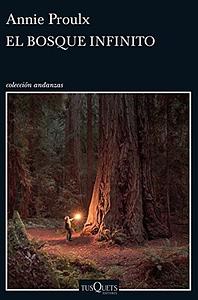You need to sign in or sign up before continuing.
Take a photo of a barcode or cover
What a work! The research she must have done is staggering. And I learned last night as well that Annie Proulx was in her EIGHTIES when this was published. Do not ever let age get you down!
So much to process here. The loss of natural land, and the role that so many people played in this book towards it. The swiftness of change of fortune--how so little is truly in your control, how your fate can change in an instant and that instant has ripple effects for generations. The loss of familial history, and what make up family bonds.
I felt the ending might have been a little too on the nose, but I think Ms. Proulx deserved the ending she wanted after such an incredible novel.
My favorite section to read was James and Posey. They weren't my favorite people--they were rather awful!--but I found it a delight to read.
So much to process here. The loss of natural land, and the role that so many people played in this book towards it. The swiftness of change of fortune--how so little is truly in your control, how your fate can change in an instant and that instant has ripple effects for generations. The loss of familial history, and what make up family bonds.
I felt the ending might have been a little too on the nose, but I think Ms. Proulx deserved the ending she wanted after such an incredible novel.
My favorite section to read was James and Posey. They weren't my favorite people--they were rather awful!--but I found it a delight to read.
Fascinating historical novel about the great forests of North American in the wake of French English colonialism tracing the exploits and adventures of two interconnected families from the early C17th to the present - one entrepreneurial and wealthy whilst the other marrying into Native American families and feeling the loss of culture and livelihood. I felt it petered out a bit towards the end as it tried (not entirely successfully) to reconcile the character drama with the figure of the forest itself - postcolonialism and environmentalism - but came across as a bit fey. I think the exploitation of the forest, the endless centuries of destruction and waste of trees (and people) had come through clearly and steadily already and I could make the ties with broader issues of climate change for myself. But that didn't really steal from the achievement of making what could seem pretty dry into such a lively and gripping read.
While this was a difficult book to read (I listened), but it was very enlightening in the end. There are a lot of characters over a very long time period and it is very difficult to keep them straight. I stopped worrying about it and listened for the gist of it. It tells the story of Europeans coming to North America with their economic interests paramount. Most of them don’t appreciate the value of trees for anything but money and they have absolutely no understanding of the native Americans who value the trees for so much more. What I got out of this expanded my existing conservation/ecosystem ethic and left me with anger and a little hope. I must admit that if I had been holding and reading the book, I would not have made it all the way through, but I’m glad that I had the listen. The amount of research done for this is absolutely phenomenal!
informative
slow-paced
Plot or Character Driven:
Plot
Strong character development:
Yes
Loveable characters:
No
Diverse cast of characters:
Yes
Flaws of characters a main focus:
No
A historical saga of the lumber industry in North America spanning centuries and generations.
This book was quite something! Took a long time to get momentum because I was getting confused with all the different characters and timelines BUT I loved it once I was in the weeds. Would have benefited from a paper copy so I could look at the family tree but alas I chose kindle.
The quality of writing carried me through this book, though my love of forests didn't hurt. The ending sort of rambled of into the sunset - a disappointing conclusion to 700+ page novel. In the interview with Powell's Books, Proulx mentioned that not only could she have kept writing for another year, but she had to cut about 150 pages from the manuscript as it was. I felt that this was evident in the second half of the book as the characters and storyline felt a little more scattered, less polished.
I actually read this much more quickly than I expected, because I really did enjoy the writing and spending so much time in the forests. The glimpse into French Canadian history was very enjoyable, and the tribute to the Native cultures was wonderful. But reading this on the tail of Homegoing by Yaa Gyasi - a book similarly showing two family lines through the generations - made it pale in comparison. There isn't a strong enough sense of direction in Barkskins, and the family trees were very confusing. After the two initial characters being painted rather vividly, many of the rest were rather shadowy structures. I don't regret reading it, but it doesn't get a robust recommendation from me either. The good thing is, you'll know pretty quickly if you'll enjoy it or not by the style of writing.
I actually read this much more quickly than I expected, because I really did enjoy the writing and spending so much time in the forests. The glimpse into French Canadian history was very enjoyable, and the tribute to the Native cultures was wonderful. But reading this on the tail of Homegoing by Yaa Gyasi - a book similarly showing two family lines through the generations - made it pale in comparison. There isn't a strong enough sense of direction in Barkskins, and the family trees were very confusing. After the two initial characters being painted rather vividly, many of the rest were rather shadowy structures. I don't regret reading it, but it doesn't get a robust recommendation from me either. The good thing is, you'll know pretty quickly if you'll enjoy it or not by the style of writing.
I'll start with the obvious, this book is a sweeping saga of epic proportions. That being said, it's also a true book lover's book and definitely requires a commitment. It has an important message that Proulx has delivered with an unbelievable amount of research and passion. The first half is like trudging through the mud of the Shiawasee Trail as she takes us from 1693 in what was once Canada up to 1825. The second half was much easier to absorb and process but relied heavily on the character setup and history from the previous two centuries. She then takes us into present day, but always with the thread of the past tied in nicely. What an amazing read!
i think if you care about writing/writing (verb/noun) today, you need to be reading proulx. doesn’t matter if you think you’re interested in the subject or not: the ability with which she shapes her stories at every level of focus is nuts. one of a few really doing it.
in some ways, a completely atypical book, with its huge scope, utterly clear, labyrinthine structure, and fundamental thematic point: this is about wood, the woods, the world. however, also reminded me how much i like historical novels, because it has so much of what makes the best of them great: bursts with history, detail, sprawl, complicated family relations, business dealings, insane deaths. in many ways, in fact, this is just a reeling off of ways to die in the wild, but the flip side of that is a lot of lives are lived first.
am fascinated with the emergence, growth, of familiarity throughout the novel: known place names, in-text repetitions (like the promethean appearance of fires as a major risk part way through) create a world which becomes increasingly familiar, whilst clearly emerging in sequence with what came before; saying, these pasts are today’s inheritance, they are not separate, alien, they bleed directly into their future which is our past and present. there is so much wood around me right now. what is to be done?
am fascinated with the emergence, growth, of familiarity throughout the novel: known place names, in-text repetitions (like the promethean appearance of fires as a major risk part way through) create a world which becomes increasingly familiar, whilst clearly emerging in sequence with what came before; saying, these pasts are today’s inheritance, they are not separate, alien, they bleed directly into their future which is our past and present. there is so much wood around me right now. what is to be done?
adventurous
challenging
informative
sad
slow-paced
Plot or Character Driven:
Character
Strong character development:
Complicated
Loveable characters:
Complicated
Diverse cast of characters:
Yes
Flaws of characters a main focus:
Complicated
I really enjoyed the authors writing style, but the book was too long for me. About halfway through I lost interest and skimmed the remaining chapters. I liked that the chapters were on the shorter side. Ultimately there were too many characters to keep track of and the time skipping was unclear in places that made it difficult to picture the setting.
Did not follow consistent cast of characters



